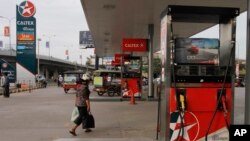Cambodian Prime Minister Hun Sen said Tuesday that the country’s long-awaited first commercial extraction of oil has finally begun.
Speaking nationwide on state television, Hun Sen said the first drop of oil was extracted on Monday by KrisEnergy, a Singapore-based oil, and gas company, from a well in offshore Block A in the Gulf of Thailand, west of the coastal Cambodian province of Preah Sihanouk.
“The start of production is a blessing for our Cambodia,” Hun Sen said. "It is a first important step for Cambodia to boost its capacity to reach its goal as an oil and gas producing country.”
“COVID-19 disturbed but could not destroy our attempt to produce oil," he added.
The 3,000-square-kilometer (1,158-square-mile) Block A concession is estimated to hold as much as 30 million barrels of oil reserves. It was discovered in 2004 and initially held by oil giant Chevron, which sold its stake to KrisEnergy in 2014.
KrisEnergy, which was granted production rights by the government in 2017, holds a 95% share in the project, and the Cambodian government the remaining 5%.
Production began from a single development well in the Apsara field, and according to an announcement from the oil company, is expected to reach a peak rate of approximately 7,500 barrels of oil per day once the drilling program is completed and four more development wells come online in mid-February 2021.
“Our task now is to complete drilling of the four remaining wells, stabilize production and monitor performance so that we may assess the best path forward to optimize Cambodia’s oil production and the value of the asset in the years ahead,” the announcement quoted Kelvin Tang, head of KrisEnergy’s Cambodian operations, as saying.
In the past decade, several companies from Australia, China, France, Indonesia, Malaysia, Singapore, and South Korea also have expressed interest in exploring Cambodian waters for oil.
Critics have expressed concern that oil income could exacerbate Cambodia’s already rampant corruption if the government fails to develop a proper legal environment to manage the expected windfall.




